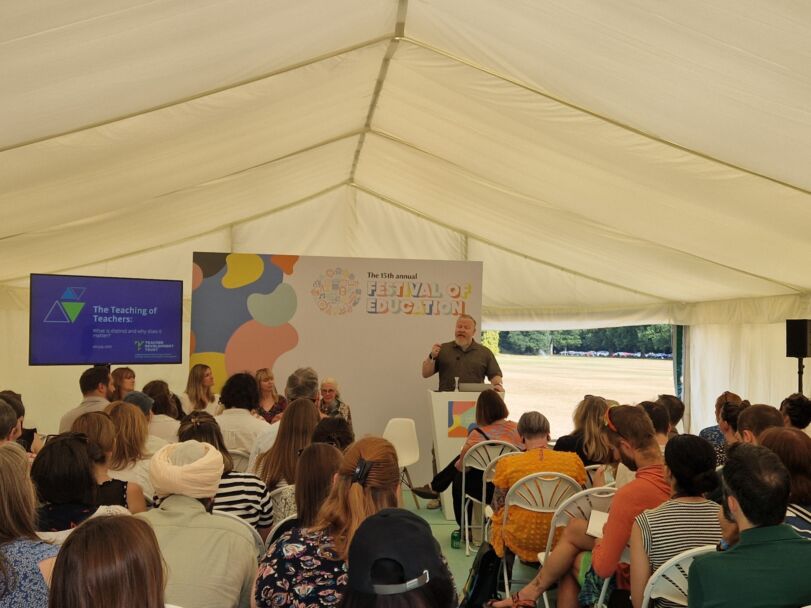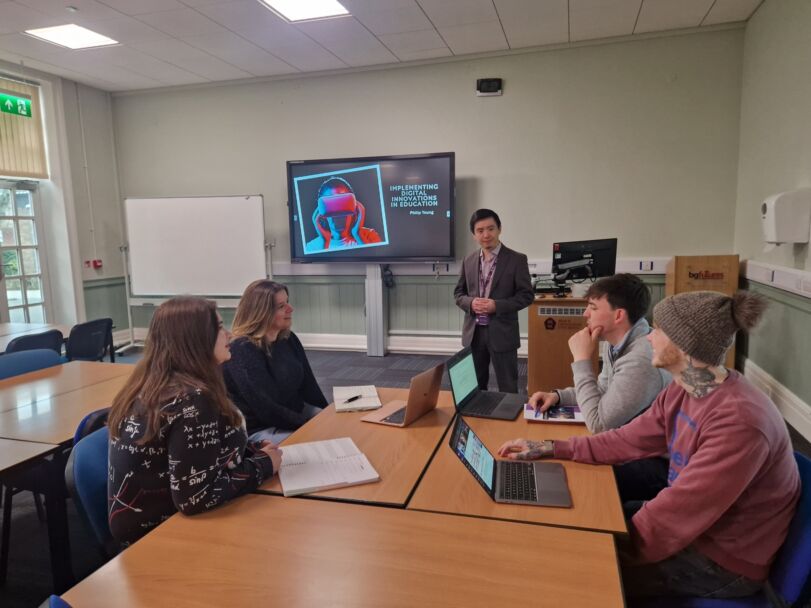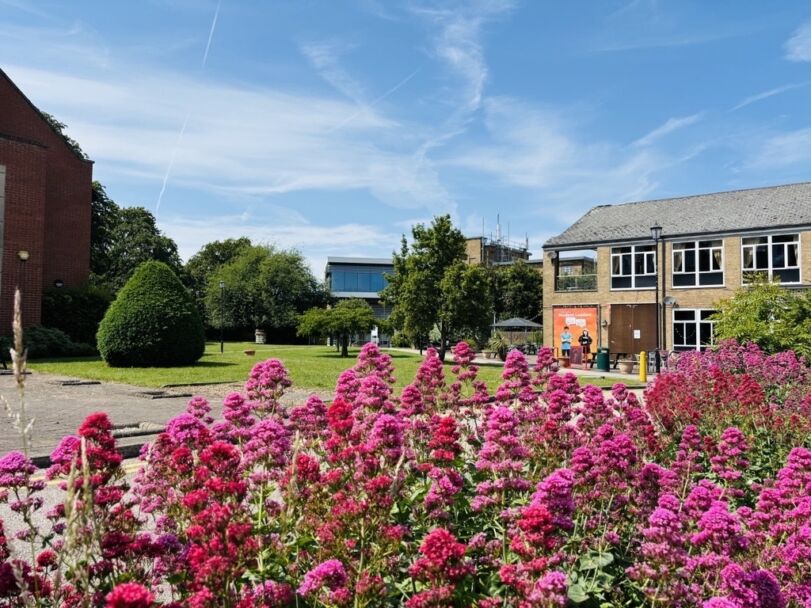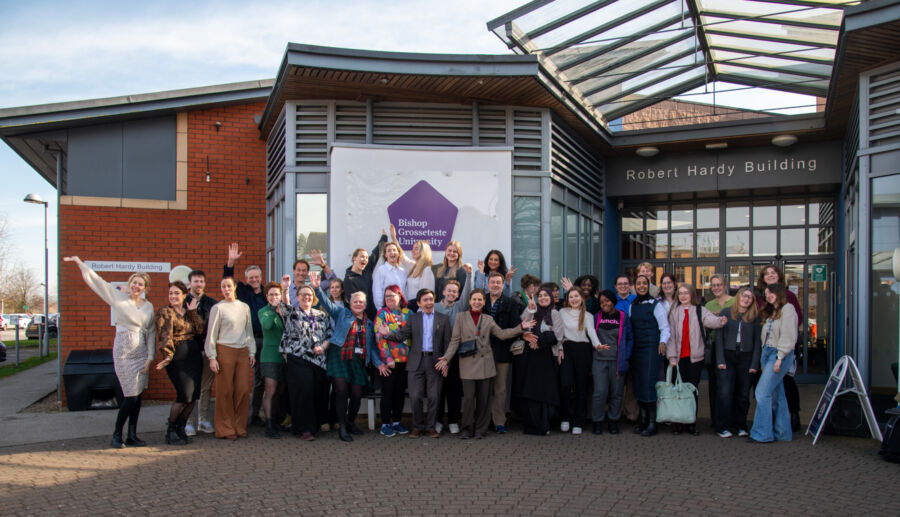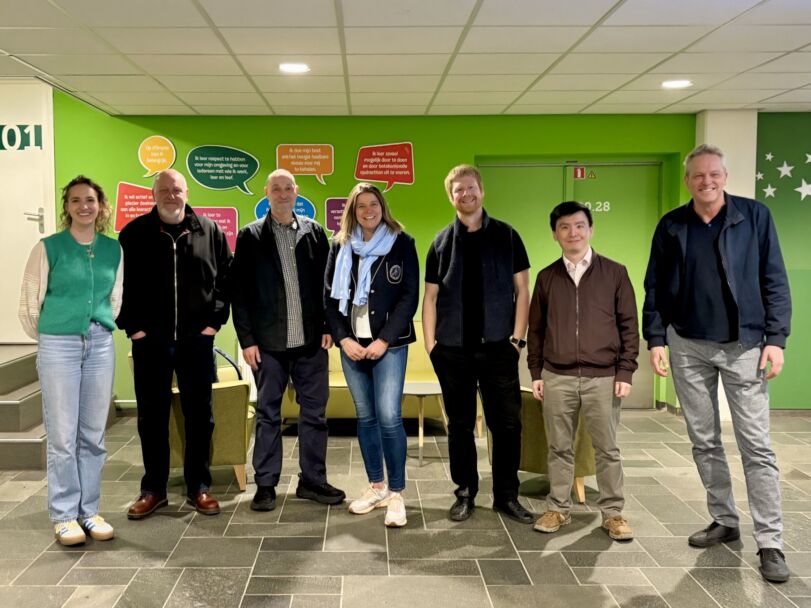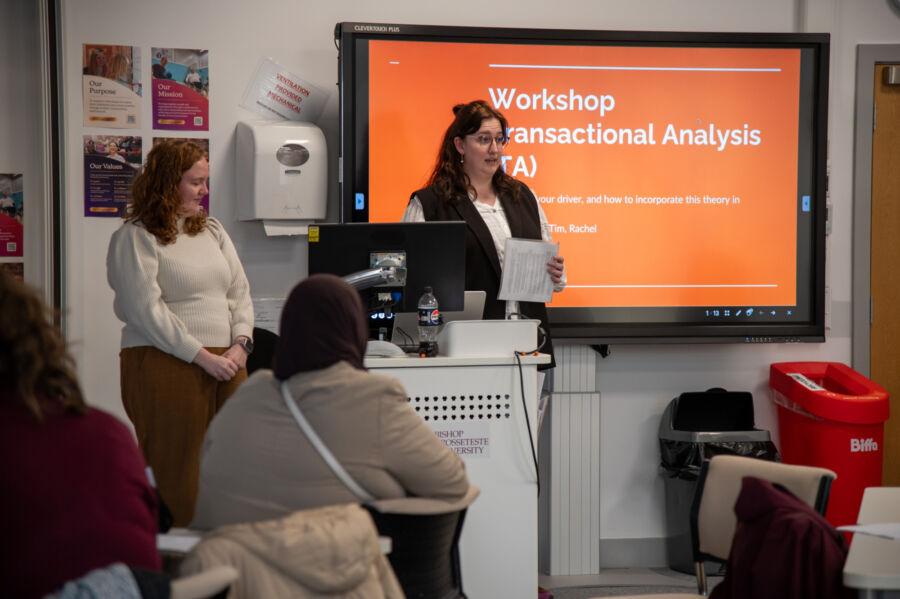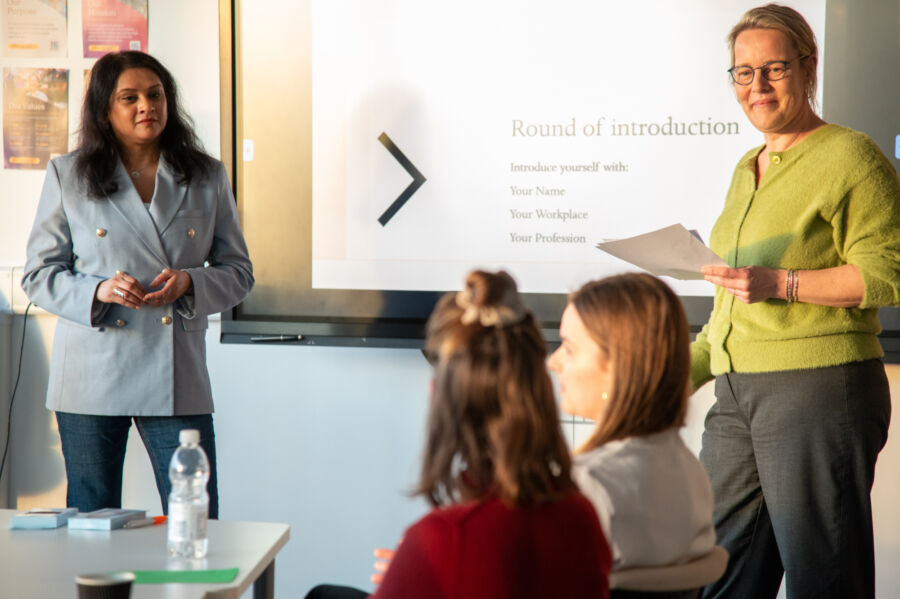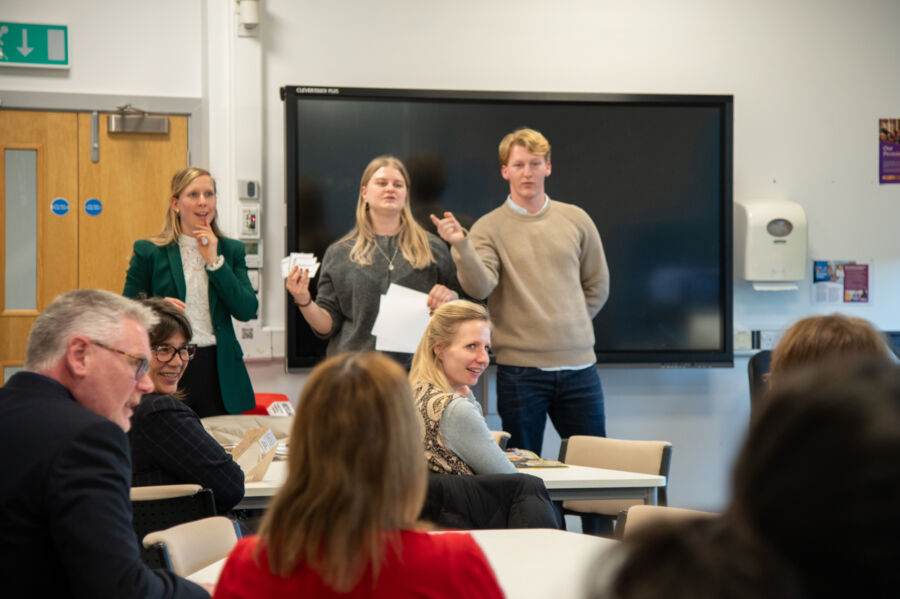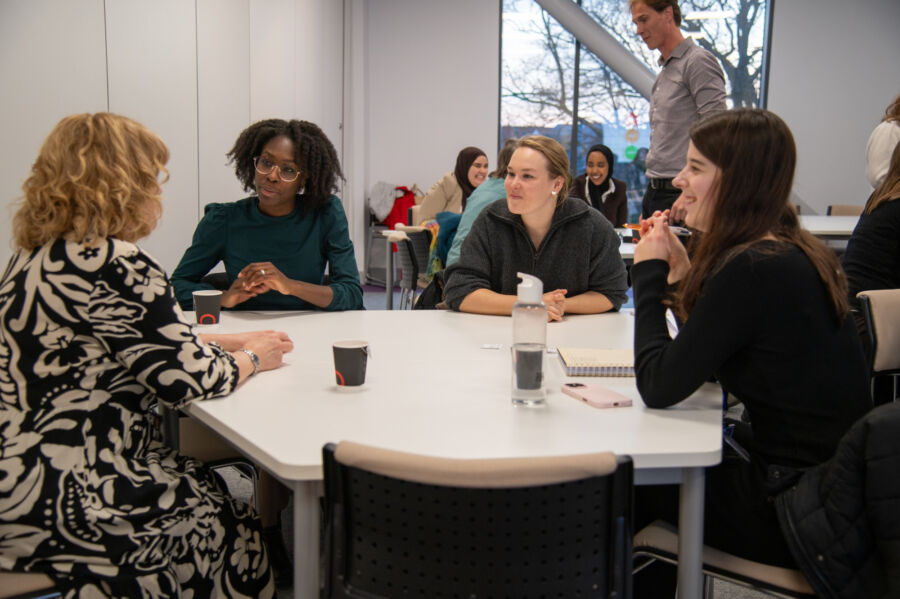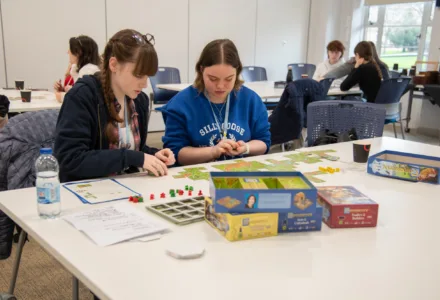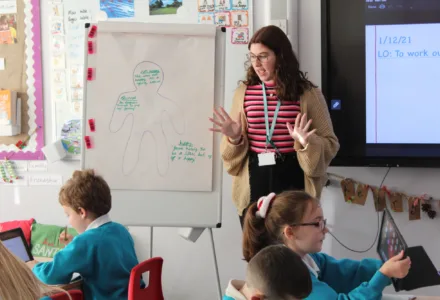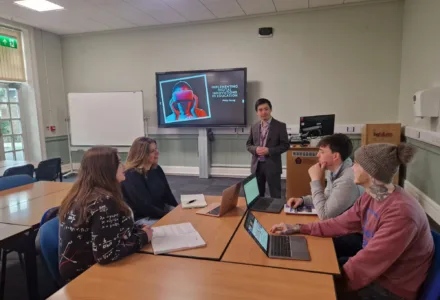Why study this course
Gain specialist expertise in classroom techniques and whole-school EAL approaches.
Study your way with our three flexible study modes that fit your lifestyle.
You’ll develop a critical awareness and understanding of theory and practice, which will inform and develop effective EAL practice in the classroom and at educational management level.
Course summary
Our MA Education (English as an Additional Language) is designed for educators working with EAL students who wish to build expertise in this specialist area. Available in three study modes—full-time (1 year), part-time blended (2 years), and part-time online (2 years)—this programme allows you to examine current theory and practice while developing practical strategies for supporting EAL learners. You'll gain advanced knowledge of classroom techniques, whole-school approaches, and research-informed practices for EAL pupils at compulsory school age. The course suits professionals across various educational settings, from classroom teachers to senior leaders, helping you enhance both your understanding and career prospects in this growing field.
Key facts
|
Award |
MA |
|---|---|
|
Duration |
1 or 2 years |
|
Mode of study |
Full time, Part time, Blended, Online |
|
Start date |
September 2025 |
|
Award |
Bishop Grosseteste University |
|
Institution code |
B38 |
Apply for this course
When you're ready to apply, the route you take will depend on your personal circumstances and preferred method of study. Click the relevant button below to start your application journey.
About this course
This master's programme builds your knowledge and skills in supporting students with English as an Additional Language. The curriculum combines educational theory with practical application relevant to your professional setting.
The full-time programme completes these modules over one year, with the first two modules in trimester one, the next two in trimester two, and the research project in trimester three.
Part-time blended students study over two years, combining three on-campus MA Weekends each year (held in October, February, and June, typically on a Friday evening and Saturday) with online learning.
In your first year you will take one module per trimester starting with a core module on vision, practice and policy, followed by two optional modules tailored to your interests. In Year 2, you will begin with a core module on research skills, then carry out your own research project across Trimesters 2 and 3.
Part-time online students study over two years, with 100% online delivery designed to offer maximum flexibility. The learning is largely asynchronous, allowing you to study at times that suit your schedule. This study mode is ideal for practitioners in full-time employment, including those who are working outside of the UK.
In your first year you will take one module per trimester starting with a core module on vision, practice and policy, followed by two optional modules tailored to your interests. In Year 2, you will begin with a core module on research skills, then carry out your own research project across Trimesters 2 and 3.
What you will study
Students on this course currently study some or all of the following modules:
This module explores key elements of effective practice, guiding learners to engage with contemporary and potential future challenges related to professional contexts.
You will reflect upon competing ideologies which shape and influence policy visions. By linking theory and practice, learners will develop strategies to address real-world challenges within a range of settings. The reflective nature of the module makes it highly relevant for professionals across various disciplines.
With increasing numbers of EAL learners in classrooms in England and the rest of the UK, it is vital that you, as teachers and education providers, are equipped with the knowledge and skills to help ensure all learners in your classes can access learning and thrive in a range of educational contexts. Although relevant to all age phases, the module will cater primarily to supporting you in primary and secondary education.
The EAL (1) module therefore aims to develop your confidence in your ability to support EAL learners in your classroom. Content in the module will include: teaching methodologies; classroom techniques; materials adaptation and design; assessment tools; and, alongside these, key theoretical topics in Second Language Acquisition which are relevant to EAL learners and practical classroom and educational contexts. The module will also introduce and encourage you to develop and extend your networks and knowledge of resources in the field, so that you can continue to develop professionally once the programme has concluded.
A further aim of the module is to develop your language awareness and knowledge of other language systems, such as the grammar of other languages and writing systems your EAL learners may use, by way of comparison with your familiarity with systems in standard English. This knowledge is viewed as core knowledge for you to identify where and why issues may arise in the English language development of the EAL learners you teach.
The EAL (2) module will guide you, as a current or future education leader such as a member of the senior management team to reflect on and develop your professional practice and awareness of best practice in whole-school approaches to EAL. There will be a highly practical focus on strategies to ensure your school or education setting develops practices that provide effective support for EAL learners, their families, and the wider communities throughout the learners’ journey.
Broader issues from policy, research, and reports relating to EAL in England will also be a focus, enabling you to contextualise your own setting. Overall, the module aims to provide you with the skills and knowledge, through engagement with research, to develop strategies that improve the outcomes and experiences of EAL learners in your setting, with a detailed awareness of the wider picture in England.
This module explores a range of methodologies and methods frequently used in social science research, examining their potential strengths, limitations and the associated ethical considerations.
During the module, you will develop your understanding of research concepts such as reliability, validity, trustworthiness, credibility and generalisability You will also consider how to plan research using a suitable methodological approach, whilst taking into account the ethical issues you may encounter.
The module will facilitate learning and teaching in research skills. The module will lead to competence and confidence in what determines personal and professional standards for postgraduate research requirements.
The module develops you as an ethical researcher who will be able to undertake a suitable research project, develop realistic plans for disseminating your research findings to the wider academic and/or professional community. In addition, you will be supported to extend and deepen their understanding of the chosen area of investigation and will be able to design and carry out projects that are useful to your professional development and/or interests, and employability.
Entry requirements
Entry to the MA EAL programmes typically requires a second-class degree (2:2 or above) in a relevant subject.
We assess each application individually, recognising that academic potential can be demonstrated through various professional and educational backgrounds. We value diverse professional backgrounds and recognise that valuable skills can be developed through various pathways.
For international applicants, English language requirements are IELTS 6.5 with a minimum of 6 in each component.
Full-time students are not required to undertake work-related learning.
Part-time blended and part-time online students are expected to hold a professional role (paid or voluntary) within an educational setting for the duration of the course, typically 5 hours a week.
If you have any questions about the entry requirements for this course, please contact our Enquiries team for advice on +44 (0) 1522 583658 or email courseenquiries@bishopg.ac.uk.
BGU is committed to widening access and participation and we adhere to a strict policy of non-discrimination.
Further information
In accordance with University conditions, students are entitled to apply for Recognition of Prior Learning, RP(C)L, based on relevant credit at another HE institution or credit Awarded for Experiential Learning, (RP(E)L).
How you will be taught
Teaching methods vary across the three study modes and are designed to accommodate different learning needs. To support this, teaching methods vary across the three study modes, designed to accommodate different learning needs:
Full-time students
You will be fully engaged in a dynamic learning environment with our campus-based sessions. You will be encouraged to connect theory to real-world situations by reflecting on your own experiences, perspectives, and learning context. This reflective approach will deepen your understanding and ensure your learning remains meaningful and relevant to your professional development.
Learning takes place through a variety of activities, including lectures, seminars, workshops and tutorials. You will take part in discussions with peers and tutors, complete independent tasks relevant to a range of topics, and receive individual supervision for your research project. Each module includes assignment workshops and tutorials where you can ask questions and receive guidance on your work.
Part-time blended students
During MA Weekends, you will take part in taught sessions, peer networking, and academic support activities. Between weekends, you will engage with online learning through the virtual learning environment, accessing pre-recorded materials, visual presentations, recommended readings, and interactive tasks. You will also have online or in-person tutorials to discuss assignments and receive feedback.
Throughout the programme, you will be encouraged to apply theory to practice by reflecting on your own professional experience and context. This reflective approach helps deepen your understanding and ensures your learning remains relevant and impactful.
Part-time online students
Throughout the programme, you will be encouraged to apply theory to practice by reflecting on your own professional experience and context. This reflective approach helps deepen your understanding and ensures your learning remains relevant and impactful.
The interactive design of the course supports meaningful engagement with learning materials and encourages collaboration with peers from a wide range of educational settings and contexts. Learning materials include pre-recorded materials, visual presentations, recommended readings, and interactive tasks. You will also benefit from regular opportunities for personalised support, through Q&A opportunities, assignment webinars, and online tutorials. While most activities are asynchronous, occasional synchronous sessions help build connections and maintain a positive learning community.
Assessment
All delivery modes use similar assessment approaches, offering varied ways to demonstrate your skills, knowledge and understanding. Each assignment typically contains at least two related tasks, allowing you to meet learning outcomes while developing various academic skills. The different types of assessment include:
- Portfolios
- Presentations with Q&A sessions
- Research method evaluations
- Dissertations based on independent research projects
You will receive formative feedback during each module via tutorials, which will guide your development and allow you to refine your work before final submission.
Assessment deadlines are timed to coincide with academic holiday periods (January/May/August), making the workload more manageable for those with personal and professional commitments.
Careers & Further study
The MA Education (EAL) responds to growing demand for specialists in this field, with organisations seeking staff with expertise in supporting children and young adults with additional needs, including EAL.
Completing this MA positions you strongly for roles requiring specialist knowledge of EAL provision, whether in educational settings, leisure industries, or sporting organisations. The qualification is particularly valuable for those aspiring to leadership positions where a whole-school EAL strategy is required.
Throughout the programme, you'll develop transferable skills including critical analysis, research competence, reflective practice, and decision-making in complex situations. These skills enhance your effectiveness in current roles while opening doors to new opportunities.
This MA also provides an excellent foundation for those wishing to pursue doctoral study through EdD (Doctor of Education) or PhD programmes.
What Our Students Say
Discover what life is like at Bishop Grosseteste University from our students.
Support
Studying at BGU is a student-centred experience. Whether you are on campus or studying online, you will be part of a friendly and supportive community where meaningful connections matter. You will get to know staff personally and feel confident reaching out for help and advice. No matter how you study, you will benefit from regular interaction with staff who recognise and value you as an individual with unique talents and interests.

We will be there to support you, personally and academically, from induction to graduation.
At BGU we have so much support available for our students, the type of support that has won us awards recently in the What Uni Student Choice Awards 2023, such as the Chaplaincy team, the Student Advice team, CELT, BGFutures and representatives at the Students’ Union.
Fees & Funding
A lot of student finance information is available from numerous sources, but it is sometimes confusing and contradictory. That’s why at BGU we try to give you all the information and support we can to help you throughout the process. Our Student Advice team are experts in helping you sort out the funding arrangements for your studies, offering a range of services to guide you through all aspects of student finance step by step.
International information - how to apply & entry requirements
We do everything we can to make the transition to living in another country as simple as possible.
Moments from Our Course
During the course students participate in dynamic learning experiences and have opportunities to get involved in internal and external events, such as conferences and exchange programmes. These interactive and collaborative opportunities are designed to prepare students to make meaningful, impactful contributions in their educational environments, as well as to support and inform their master's level research.
These photos offer a brief glimpse into the connections, insights, and experiences available to our students.


